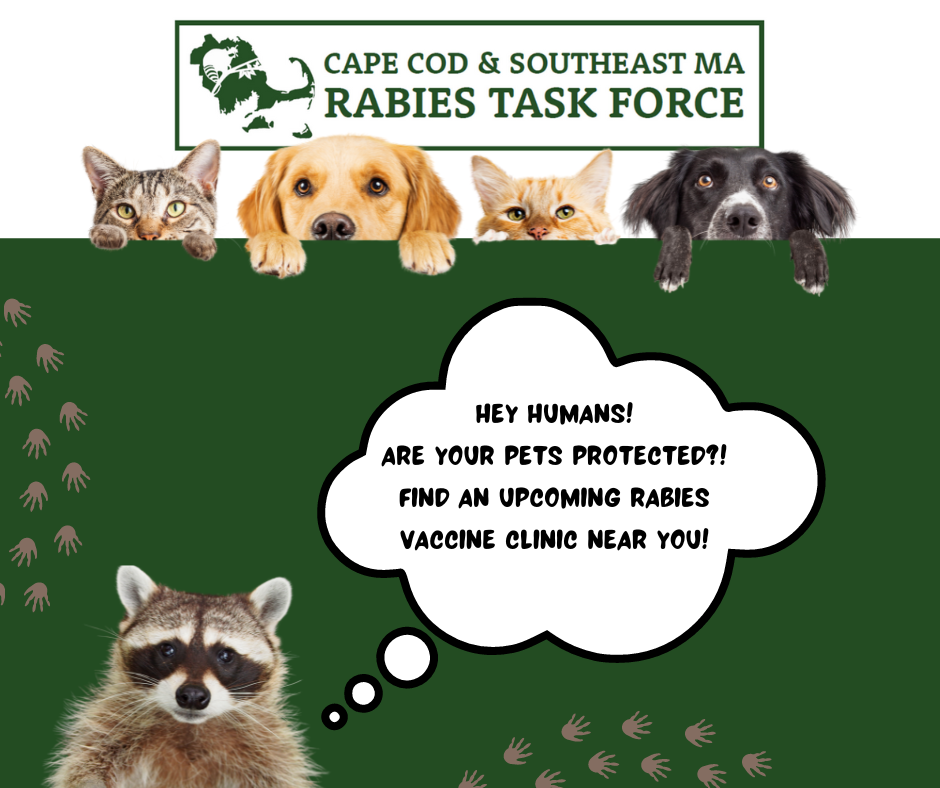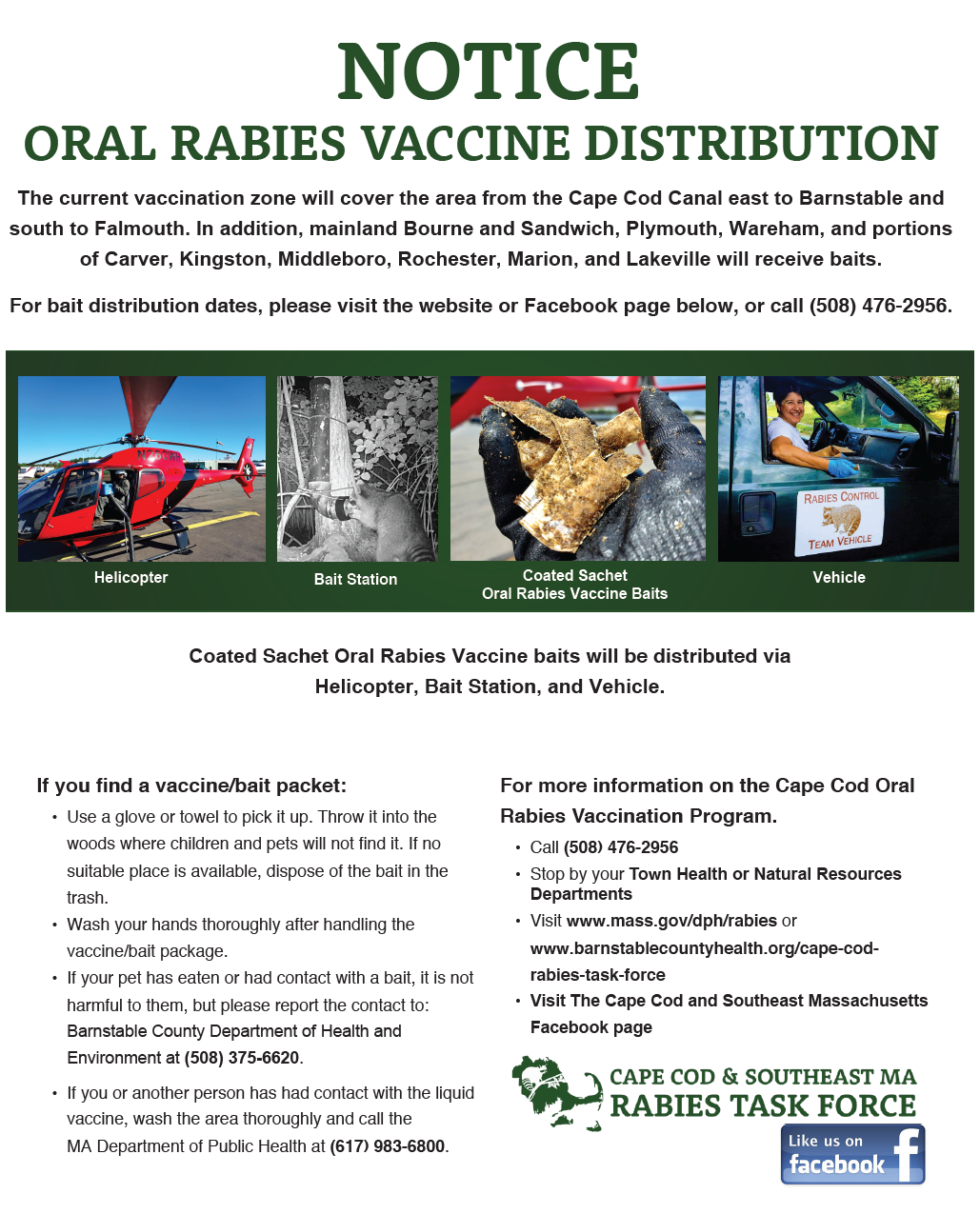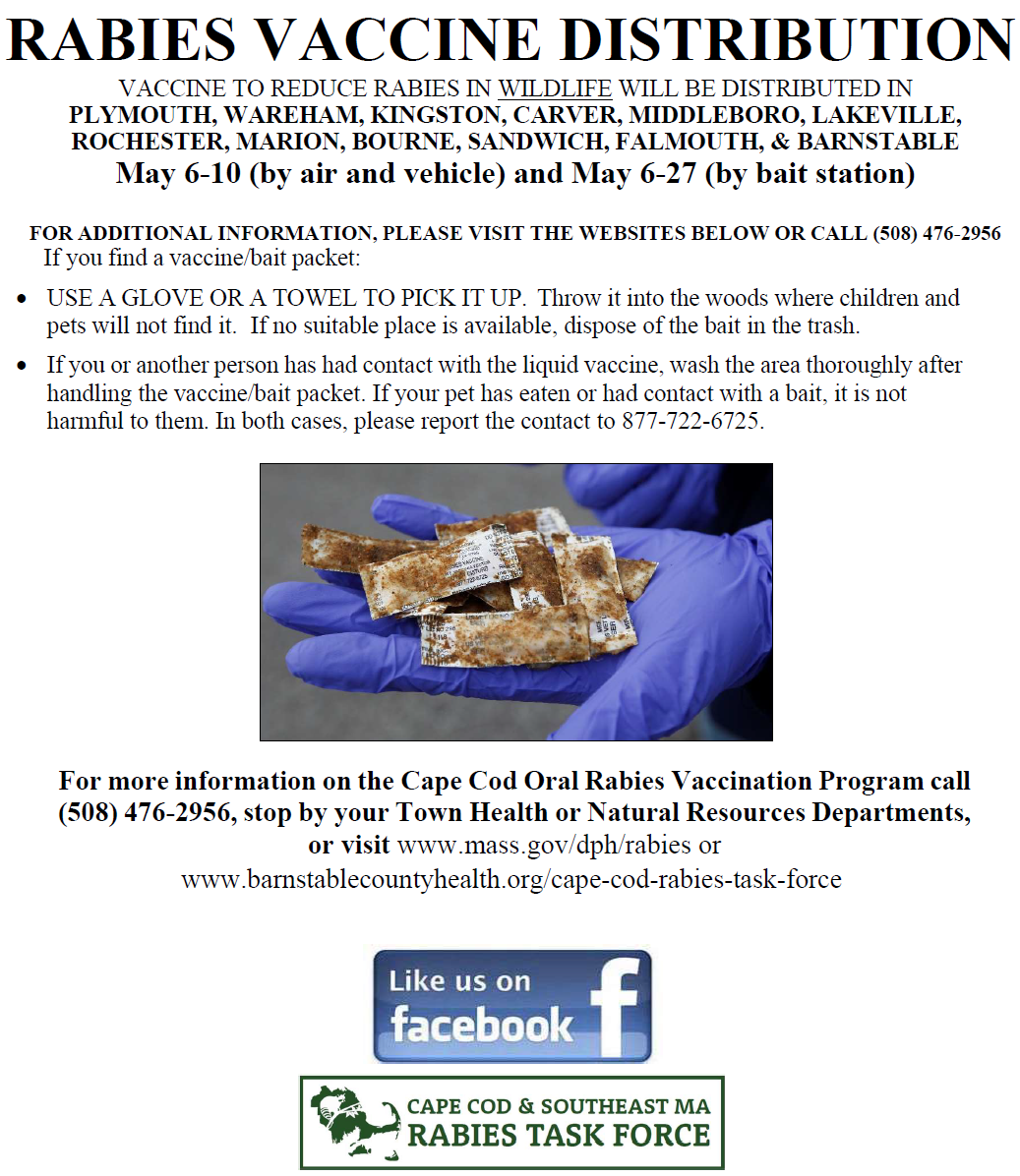
Rabies Task Force

The Barnstable County Department of Health and Environment, in conjunction with the Cape Cod Rabies Task Force, continues to assist towns with maintaining control of terrestrial raccoon rabies on Cape Cod.
In cooperation with the Cape Cod and Southeast Massachusetts Rabies Task Force (CCSMRTF), the United States Department of Agriculture-Wildlife Services (USDA) is continuing to support the Cape Cod Oral Rabies Vaccine (CCORV) Program to help reduce and eventually eliminate raccoon rabies on Cape Cod. The Cape Cod ORV Program, which began in 1994, is praised as one of the longest running, increasingly successful projects to control rabies in the country. Unfortunately, the CCORV Program was one of the many public health initiatives which lost its state funding in 2009. The USDA, as a direct result of commitments by the CCSMRTF, local communities and the Commonwealth of Massachusetts, has continued to fund the ORV baiting.
For more information on the Cape Cod Oral Rabies Vaccination Program call (508) 476-2715, stop by your Town Board of Health or visit http://www.mass.gov/dph/rabies
Cape Cod Oral Rabies Vaccination Project (CCORV)
In collaboration with the Cape Cod and Southeast Massachusetts Rabies Task Force, the United States Department of Agriculture/Wildlife Services is continuing a project to help control raccoon rabies in Southeast MA.
You can download a document with the following FAQs HERE >>>
Frequently Asked Questions
Raccoon rabies was first reported in Massachusetts in September 1992. Since that time, through 2019, there have been greater than 6,700 cases of rabies in Massachusetts. Domestic animals are at risk for developing rabies when they are bitten by an infected wild animal. Every year, many people in Massachusetts are exposed to rabies either through direct contact with infected wildlife or by contact with domestic dogs and cats exposed to infected wildlife.
From 1994 to March 2004, this project created and maintained a barrier to keep Cape Cod free of rabies by vaccinating a large number of raccoons in towns surrounding the Cape Cod Canal. In March 2004, the first rabies case was detected on Cape Cod beyond the Canal, indicating a breach in the vaccine barrier, and rabies has since spread throughout the Cape. In cooperation with County, State and Federal agencies, we continue to vaccinate Cape Cod & Southeast MA wildlife against this disease to reduce rabies cases with an ultimate goal to prevent the reintroduction of raccoon rabies to Cape Cod.
The current vaccination zone will cover the area from the Cape Cod Canal east to Barnstable and south to Falmouth. In addition, Mainland Bourne and Sandwich, Plymouth, Wareham, and portions of Carver, Kingston, Middleboro, Rochester, Marion, and Lakeville will receive baits.

The vaccine is contained in baits that have a strong fish smell specifically attractive to raccoons and un-pleasant to people. Raccoons that consume a vaccine-bait unit are vaccinated against rabies. This type of vaccine is desirable because it can be distributed in the environment and is, potentially, self-administered by wildlife. Vaccine containing baits are distributed from cars along roadsides in wooded, brush-covered, and wetland areas where raccoons are likely to find and eat them. Baits will also be dropped by helicopters. Driveways, lawns, buildings, schools and agricultural fields are avoided.
Doses of up to 75 times the amount of vaccine contained in one bait have been fed to raccoons and dogs with no ill effects. However, dogs that eat several of the fishmeal block baits may experience a temporary upset stomach. A number of dogs who have eaten baits have been reported since the beginning of our efforts and no ill effects other than an occasional upset stomach have been reported.
Studies have shown that most baits are eaten within four days and almost all baits are gone in one week. If baits are not found and eaten, they will dissolve, exposing the vaccine packet to sunlight and air, mak-ing the vaccine ineffective.
The intact vaccine-bait unit is safe for people to handle. The liquid vaccine is enclosed within a plastic packet that is either sealed within a bait block, or simply coated with the fishmeal attractant. Each bait is labeled with a warning message that includes a number to call for information. If intact baits are found, they should be placed in brushy areas where people or pets are not likely to find it. Chewed baits should be picked up with a paper towel and disposed of in the trash. If a person in physically good condition has direct contact with or ingests the liquid vaccine, there should be no adverse health effects. If a person in a compromised state of health is exposed to the liquid vaccine through an open wound or by ingestion, they could experience a reaction to the vaccine. If any person or pet is exposed to the liquid vaccine, please call the Massachusetts Department of Public Health at (617) 983-6800.
Oral rabies vaccine baits are not available for purchase by the general public or other groups. The distribution of the baits is a permitted activity through the Massachusetts Division of Fisheries and Wildlife.
Call your animal control officer or the police if you see sick wildlife – do not handle wildlife! If you do come in to contact with wildlife, wash all wounds with soap and water thoroughly; then, contact your doctor or veterinarian. Always keep your pets up to date on their rabies vaccinations.
For questions regarding domestic animal contact with bait, call Barnstable County Department of Health and Environment at (508) 375-6620
For questions about human contact with bait, call the Massachusetts Department of Public Health (MDPH) at (617) 983-6800.
Information is also available through the following websites:
-
- The Massachusetts Department of Public Health: http://www.mass.gov/dph/rabies
- The Cape Cod and Southeast Massachusetts Rabies Task Force Facebook page at: https://www. facebook.com/CapeCodRabiesTaskForce/
- Vaccine information at: http://www.raboral.com/
Spring 2024 Rabies Vaccine Clinics
The Cape Cod and Southeast MA Rabies Task Force would like to announce upcoming local rabies clinics and encourage everyone to have your animals vaccinated. Domestic pets have been identified as the link between rabies and humans, and Massachusetts State Law mandates that all dogs, cats and ferrets be vaccinated. Please call ahead for detailed information. With official proof of current vaccination, a three-year booster will be available.

The following video, produced by Lower Cape TV, provides in depth information on the Oral Rabies Vaccine (ORV) Program in 2022.





